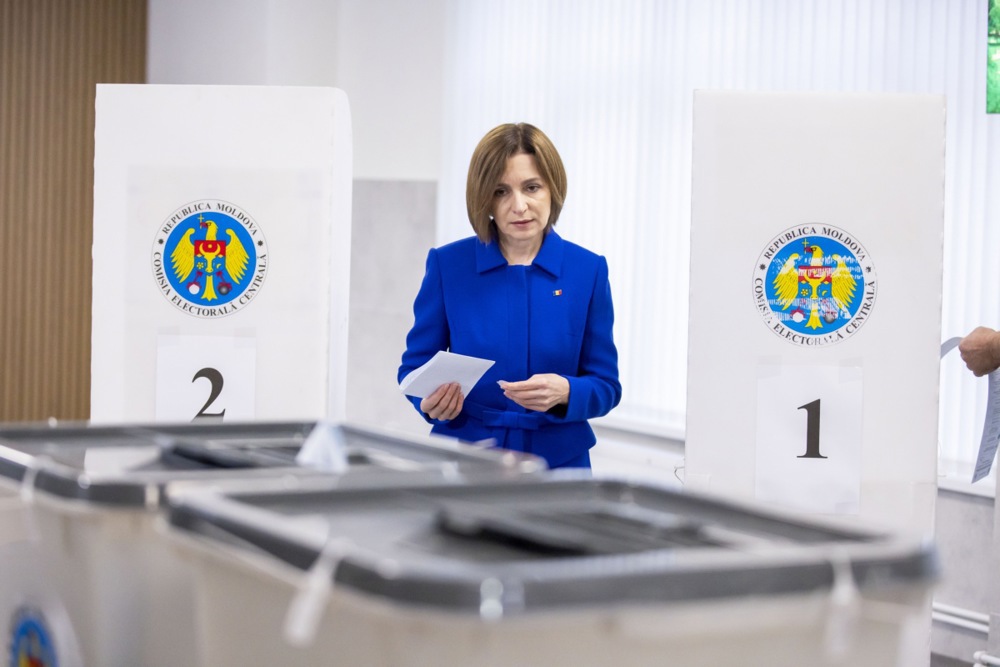Moldova’s parliamentary elections on Sunday marked a defining moment for the former Soviet republic’s future.
President Maia Sandu’s pro-European Party of Action and Solidarity secured a decisive victory, bagging over 50% of the votes and at least 54 of 101 parliamentary seats.
This resounding mandate, driven by a 52% voter turnout and strong diaspora support, reaffirmed Moldova’s commitment to EU integration, decisively sidelining the pro-Russian Patriotic Electoral Bloc, which garnered just under a quarter of the votes (24%)
The result is a clear rebuke to Moscow’s alleged election interference – hoax bomb threats and cyberattacks – and underscores the small nation’s resolve to chart a democratic, Western-aligned path.
As expected, the European Union greeted the ballot’s outcome with enthusiasm.
European Commission President Ursula von der Leyen praised Moldova’s resilience, commending the country’s clear choice: “Europe. Democracy. Freedom.”
The EU’s blue-and-stars-spangled door is “open,” the Commission chief added. European Council President António Costa, who echoed this sentiment, noting the election as a clear rejection of Russian meddling.
But even though Moldova’s vote is a bold step towards the bloc, it is not the finish line.
Corruption remains a persistent scourge for Chișinău that entered EU accession talks in 2023, with Transparency International’s 2024 Corruption Perceptions Index ranking Moldova 76th out of 180 countries.
Poverty still affects over 30% of the population, exacerbated by economic dependence on remittances and energy vulnerabilities, particularly in Russian-controlled Transnistria. Meanwhile, political polarisation – fuelled by pro-Russian individuals like Igor Dodon and his planned protests – threatens stability.
These issues, compounded by Moscow’s hybrid threats, mean that Moldova’s EU path – whether in 2030 or beyond – remains promising but fragile. It will require rigorous reforms at home and sustained Western support to prevent democratic backsliding.
After all, a chain is only as strong as its weakest link.
President Sandu and her incoming government now hold all the cards to ensure that yesterday’s victory does not become tomorrow’s disappointment.
——————————————————————————————–
Today’s edition is powered by the Party of European Socialists (PES)
PES Congress 2025: Progressive Mobilisation.
Not politics-as-usual, but a large conference uniting prime ministers, mayors, politicians, journalists, activists, artists, academics, trade unionists, and entrepreneurs from across Europe and beyond to tackle Europe’s big questions – and turn ideas into action. 16–18 October 2025, Amsterdam.
——————————————————————————————–
Roundup
No more waiting on anti-deforestation law – EU Commissioner Ribera discouraged reopening the delayed anti-deforestation law that would force companies to show proof that certain products sold in the bloc are not tied to forest clearance. Environment Commissioner Jessika Roswall announced the potential delay last week due to technical issues.
‘Stop the clock’ on AI Act – The EU’s AI Act was approved last August, but its phased implementation is still being discussed. Divisively so, according to a document seen by Euractiv. Some countries are eager to delay the implementation of rules on high-risk AI, while others pushed for the Act to move forward.
Across Europe
“Storm Gabrielle” rolls through Spain – The storm brought torrential downpour and thunderstorms across Catalonia and Valencia, as well as memories of last October’s catastrophic floods that killed 229 and triggered political disagreements in Spain. Victims’ associations are continuing to demand justice, calling for an EU-level investigation over the handling of the disaster.
France contributes troops to Copenhagen – France will deploy 35 soldiers and a helicopter with “anti-drone capability” to the European Political Community summit on 2 October, French Foreign minister Jean-Michel Barrot said. The decision comes after several mysterious drones were spotted over Copenhagen airport last week, prompting support from multiple EU countries.
Austria leads fight against food supply restrictions – Eight small and medium-sized EU countries urged the Commission to speed up action against unfair practices that inflate food prices. Economy minister Wolfgang Hattmannsdorfer noted the practices target smaller member states in particular, saying the supply restrictions “are a major reason why food and hygiene products are sometimes significantly more expensive in our countries than in others.”
